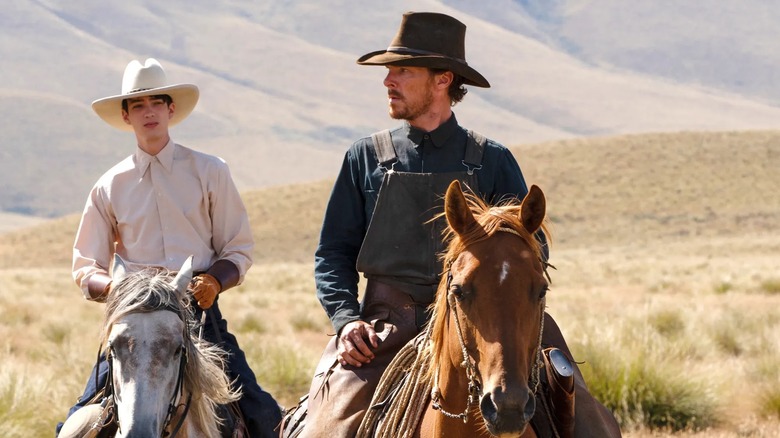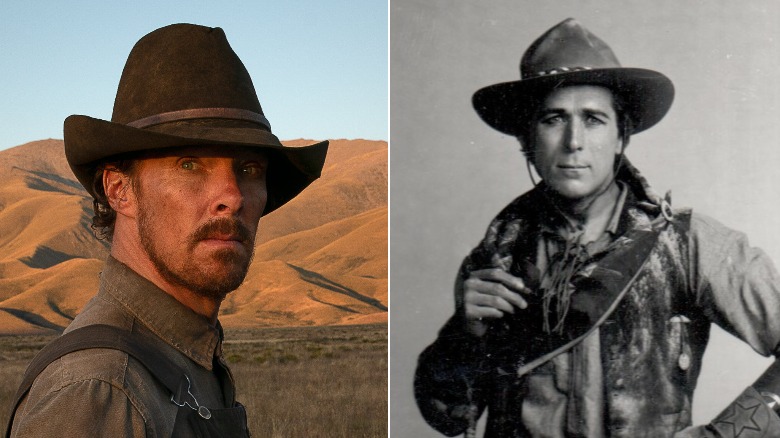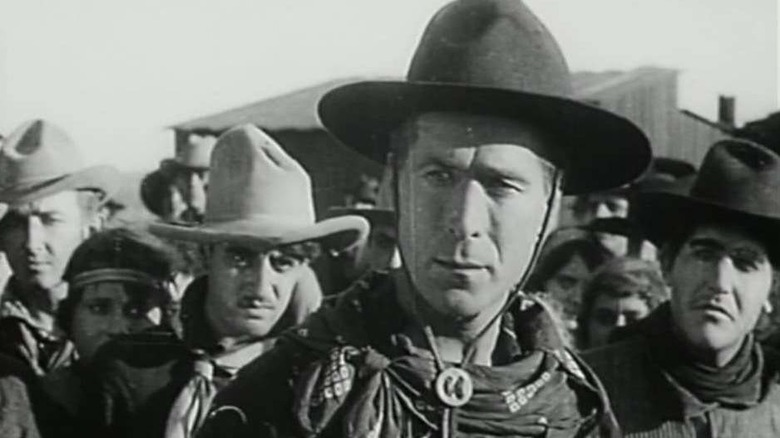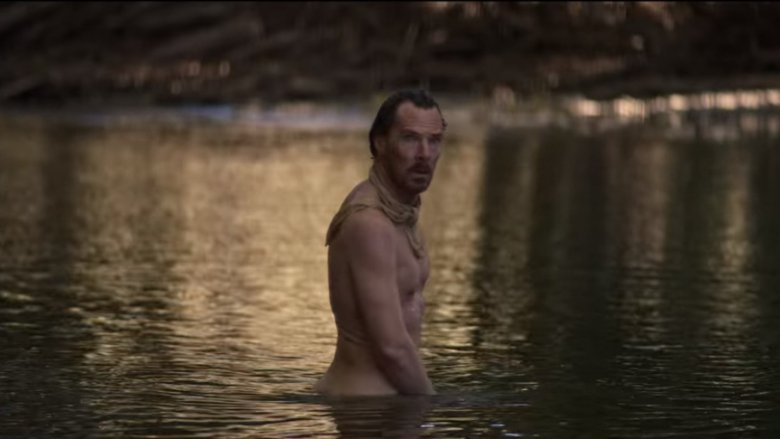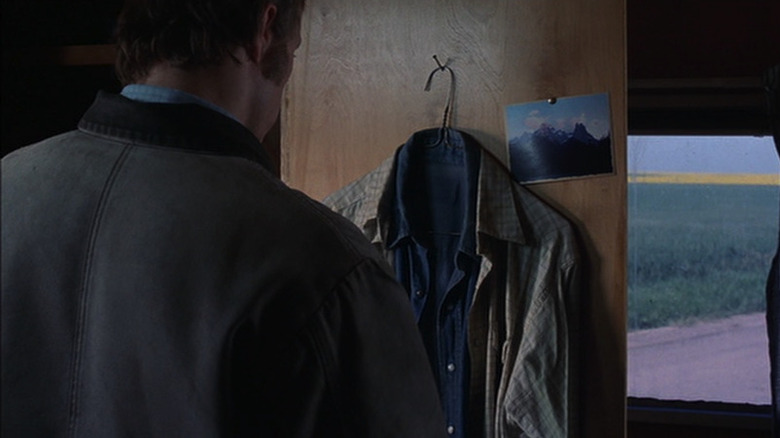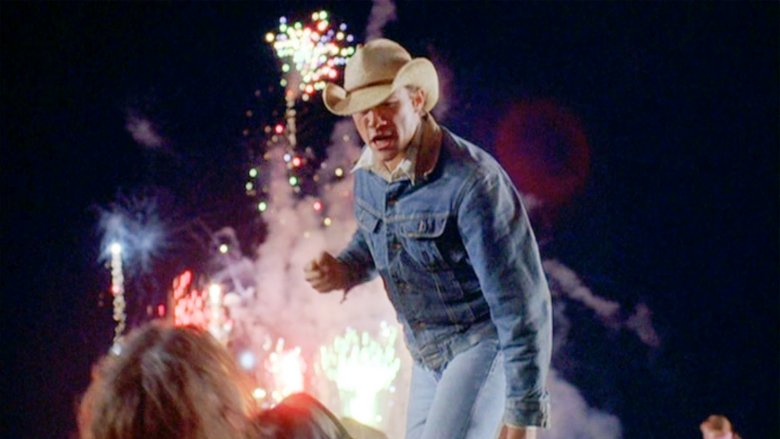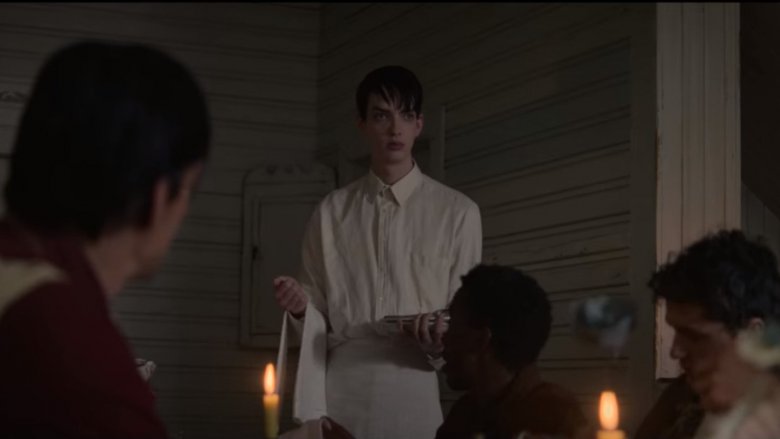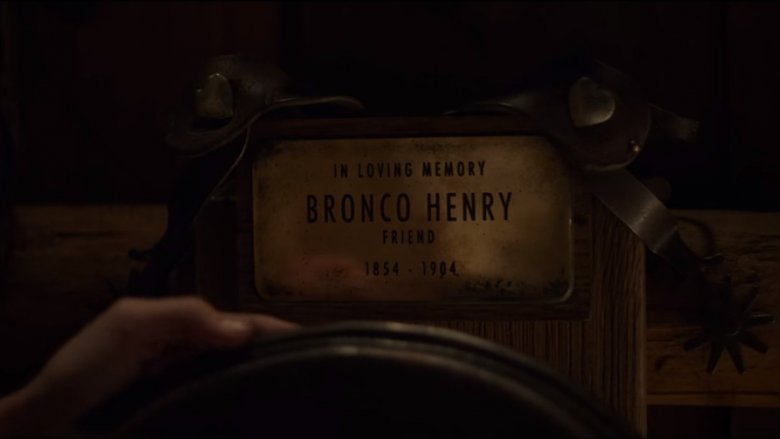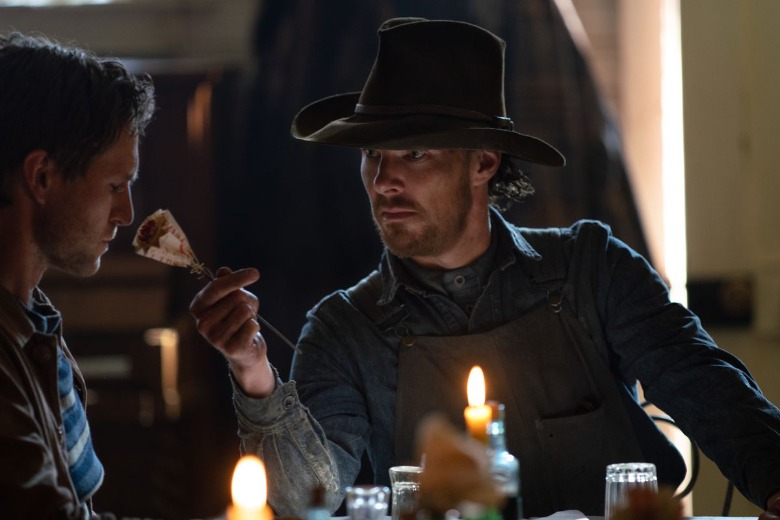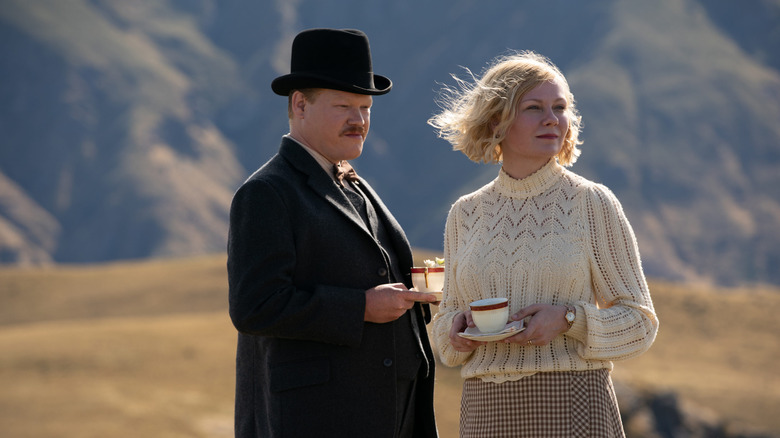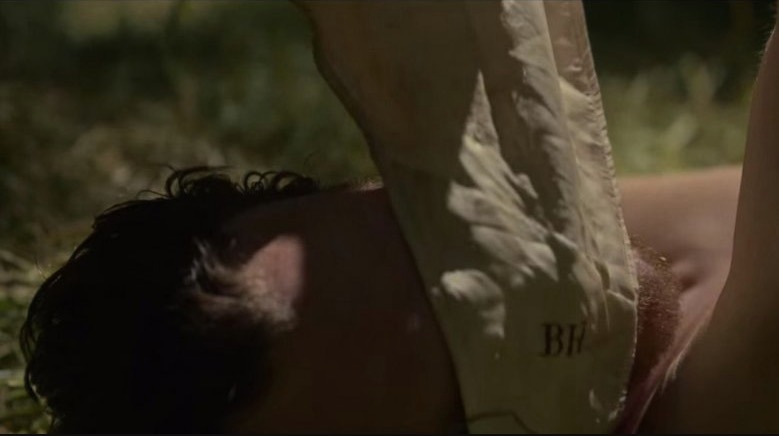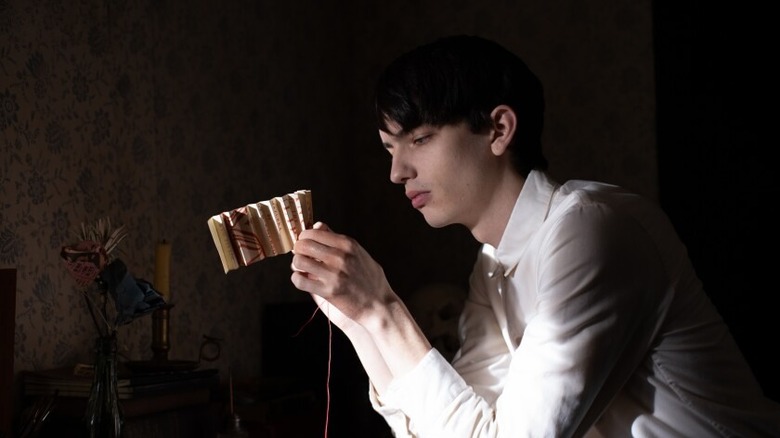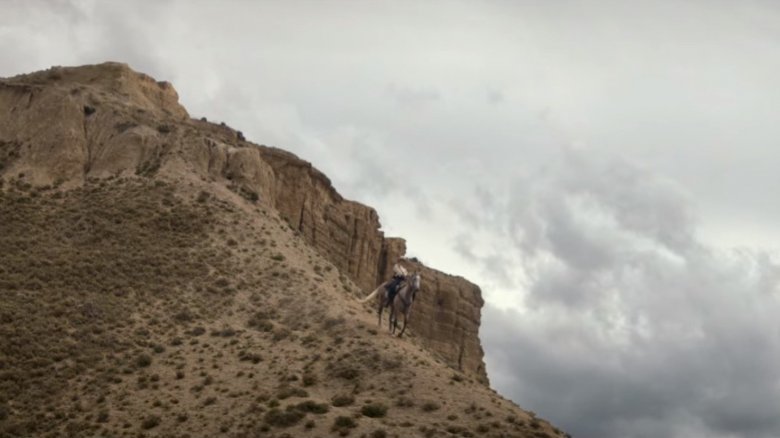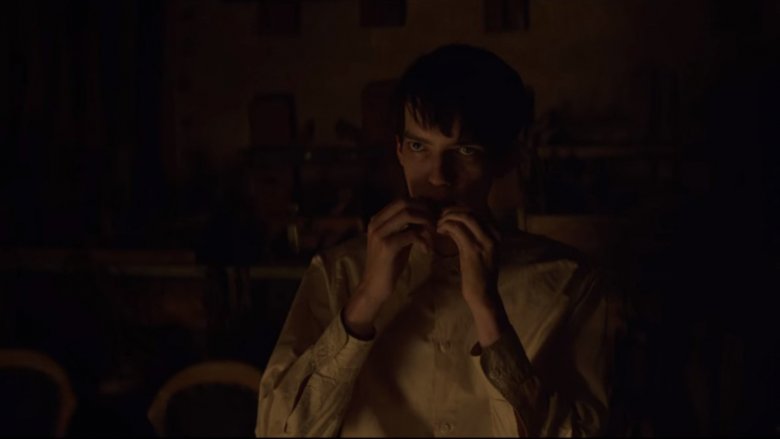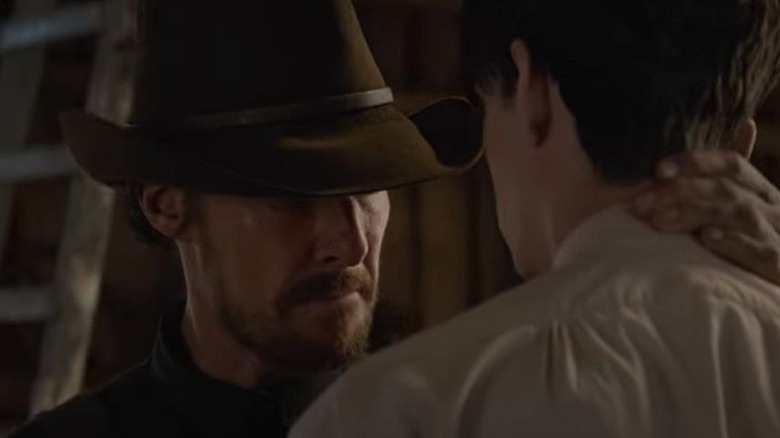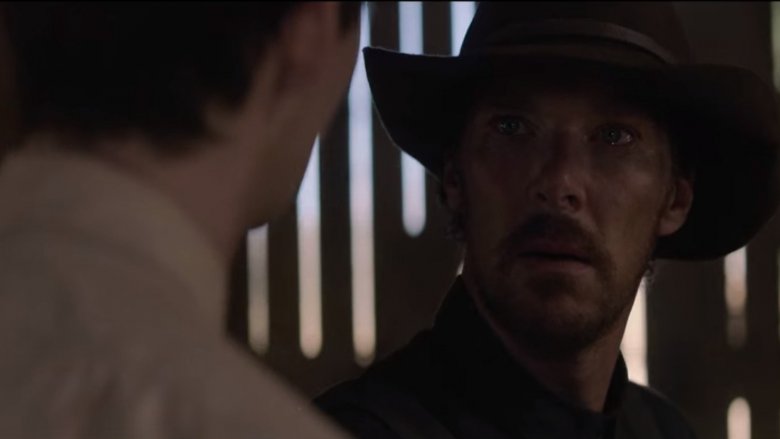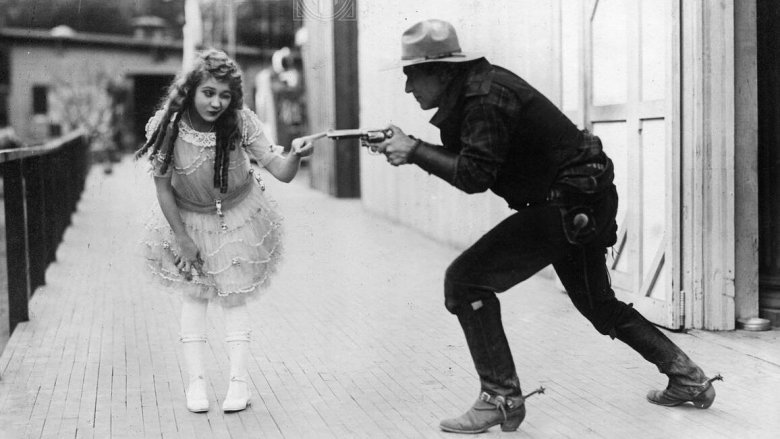What Queer Westerns The Power Of The Dog And Brokeback Mountain Owe To A Silent Movie Star
The following contains spoilers for "The Power of the Dog" (film and novel) and "Brokeback Mountain" (film and short story).
Early in Thomas Savage's 1967 novel "The Power of the Dog," a fascinating sentence appears: "Phil had never seen a moving picture and by God never would, but these young fellows had magazines about the moving pictures in the bunkhouse, and a fellow name of W.S. Hart had got to be sort of their God." This would be William S. Hart, a silent film superstar who helped popularize Westerns as a genre. Through a happy accident, he looked a little like Benedict Cumberbatch, who plays Phil Burbank in Jane Campion's recent adaptation of Savage's novel by the same name.
If Phil had deigned to see any of Hart's films, he might have realized that much of the mythos that he has constructed his life around was actually a Hollywood product, one created in large part by Hart himself.
(If, unlike Phil, you want to see a moving picture starring Hart and understand why he was sort of a God, Hell's Hinges is available in full for free on YouTube. In addition to some great acting by Hart and several other silent film stars, it also features some truly impressive pyrotechnics by any standards, not just 1916s.)
William S. Hart and the Hollywood Western
Ronald L. Davis' uneven but intriguing biography "William S. Hart: Projecting the American West" is full of bonkers quotes from its subject, each more ridiculous than the last, and all obviously in the service of promoting his films as the Real Deal. Hart claimed at one point that, "I had to teach the picture people what the West was... Nobody in Hollywood knew how cowboys acted." In his own grandiose way, he wasn't lying; his fantasies of the "real" West and the cowboys who populated it did indeed become what the world knew them to be. Never mind that he had been born in upstate New York and lived in various places in the Midwest throughout his childhood, then relocated to New York City early in his acting career. Reporters were happy to print statements such as, "I know by personal experience much of the actual life of our frontier days," (in Illinois?) and didn't question his assertions that he spoke Sioux better than he did English as a child.
Even as the Western film genre was just beginning, Hart helped ensure that it was integral to the American self-image, insisting that, "If motion pictures never did any more than perpetuate some of the things in our American life that are being lost in the dust of time, they would be worth their weight in gold." Chief among these things: the cowboy as the pinnacle of American virtue ("I know the innate fairness of any man who has ever worked among or around cattle"); the good bad man who did what needed to be done, usually to another man; the saintliness of (white) women; and the redundancy of the redundant. Real cowboys, of course, could rarely afford one gun, much less Hart's signature two. They were largely black or brown, not first-generation English/Irish, and they tended to live Hobbesian lives notable mostly for their brevity rather than any kind of glamour. If given half a chance, they hightailed it to Hollywood early in the 20th century to work for various movie studios as crewmembers, but were rarely given any credit for the genuine authenticity they provided.
Instead, stars like Hart helped popularize the clothing that became inextricably linked with cowboys. He made an early name for himself by insisting that his costumes were period-accurate. Though less flashy than later iterations, they weren't workclothes by any stretch of the imagination. In particular, his neckerchiefs tended to be purely decorative rather than functional, and wouldn't have done much good to filter any dust or prevent sunburn tied so loosely around his neck. They did, however, emphasize his shoulders and also provided a not-terribly subtle visual cue that he was at heart a Boy Scout (which Hart later parlayed into writing children's books). Campion was surely riffing off of this visual connection when she chose a neckerchief as Phil's most personal physical reminder of Bronco Henry; it does not appear in Savage's novel. It is surely the most-loved piece of clothing in a recent film, even beating out the two interleaved Western shirts in "Brokeback Mountain," which Campion is pretty clearly referencing as well.
Cosplaying Western Masculinity
There is an odd daisy-chain connection between "The Power of the Dog" and "Brokeback Mountain." E. Annie Proulx, the author of the 1997 short story that became Ang Lee's 2005 film, is a huge Savage fan and wrote an afterword to the most recent edition of his novel; her character Ennis Del Mar shares with Phil a predilection towards self-denial and occasional bursts of poorly-directed violence as well as inconsolable loss over a beloved ranch hand. Campion's film echoes Lee's in its sweeping vistas (New Zealand for her Montana; Alberta for his Wyoming), brilliant soundtrack that ties a half-hitch knot around the viewer's emotions (garrote-wire tension for hers, unbearably poignant for his), and its lead actors. If Benedict Cumberbatch leaves anything on the table, I don't know what it is, and I still have not figured out how to quit Heath Ledger. We all become Ennis and Phil whenever he appears on a screen; we have lost not just our cowboy, but all the roles he would have played.
Goddammit, Heath.
"Brokeback Mountain's" portrayal of two gay men was a watershed moment in queer film representation, arguably swaying public opinion about same-sex marriage bans at a time when they were a reliable way to get conservative voters to the polls. "The Power of the Dog" is doing something rather different, though it may end up being just as pivotal. Campion's film goes fascinating places with three of the nastiest gay stereotypes: the Repressed Closet Monster, the Sissy, and circling above it all like a hungry red-tailed hawk, the Converting Pervert.
For someone who purportedly prizes authenticity and shuns anything fake, Phil is nothing quite so much as a cosplayer. He may own a lot of cattle, but he is still mostly hat. He's the son of wealthy transplanted Bostonians and he studied Classics at Yale; he is at best a gentleman rancher, not a salt-of-the-earth cowboy. (Jack and Ennis would have talked so much crap about him.) He makes a huge deal out of working solely with his hands but won't wear gloves to protect them. His aggressively negative reactions to anything that he perceives as feminine or artificial telegraph his intense discomfort with any of those parts of himself. By the end of the film, we almost — almost — feel sorry for him. His death is not a tragedy, but his life sure was.
Savage, Campion, and Cumberbatch manage to transcend the cliché of the homophobic gay man by giving Phil layers and layers of backstory and nuanced characterization. He is desperate for control over every aspect of his life, including the things he has no control over. He keeps a dead man alive by rhapsodizing about him constantly; he literally determines the masculinity of the hapless steers he castrates; he runs a ranch by the principles of Calvin and Hobbes' G.R.O.S.S. (Get Rid Of Slimy GirlS) Club, tolerating women only when they provide food and housekeeping. It is a veritable bro paradise, featuring a wide cast of nameless and perpetually adoring young cowhands hanging on Phil's every word, frequently in various stages of undress. He and his actual bro George share a room as though they were still kids. He has everything in his life cinched about three holes too tight, with the only variables being the weather, Chekhov's Dead Steer, and occasional interactions with noisy jerks when he has to venture into Beech. Things are great, and then Rose shows up.
Mentor or Mother
The first line of dialogue in the film has Peter asking what kind of man he would be if he couldn't save his mother. This concern has never crossed Phil's mind. A mother in Phil's world is a controlling force that demands he take baths with actual soap rather than "honest dirt" — the horror! — and has designs on marrying him off to some East Coast debutante. Early in "The Power of the Dog," he compares himself and George to Romulus and Remus, and Bronco Henry to "the wolf who raised us," which is a fascinating conflation of mentor and mother and surely isn't Phil forgetting his Plutarch. He also has his own Lupercal on the Burbank ranch, a willow grove halfway between a treehouse and a fort with a secret passage, complete with vintage woods porn and a swimming hole. It is an adolescent boy's paradise, and the only place where he feels comfortable with any kind of sex, hidden away from anyone else. Phil is emotionally stuck at about 15, and "The Power of the Dog" slowly plaits up all the reasons why.
We know almost nothing about Bronco Henry other than what Phil tells anyone within earshot: he was the best rancher Phil ever knew, he saved Phil's life on a camping trip by keeping him warm with body heat in a bedroll, he never ate at the Red Mill but preferred "herring and a lot of alcohol" at the local saloon, he once took a bet and jumped a pile of old furniture while riding an old nag, he learned to ride when he was in his late teens, he never used a lunge for dumb riding stunts, he had a monogrammed silk neckerchief and a saddle that Phil treats as fetishes and relics. The saddle makes sense for the Bestest Cowboy That Ever Lived, but the neckerchief is an oddity, as is his late start as a rider. Either Bronco Henry's actual initials were B.H. or he was concerned enough with his self-image to get his neckerchiefs monogrammed with his nickname, which seems incongruous with his rugged manly exterior. And what exactly was he doing prior to his late teens, if he didn't learn to ride until then? He certainly wasn't on a ranch.
There is one thing we know objectively about Bronco Henry: George absolutely does not want to talk to Phil about him. Given that George's primary mechanism of dealing with Phil is placation, this is rather telling. He's the only person still at the Burbank ranch who saw at least some of what went on, and he very clearly is not okay with it 20 years later. It is obvious that Bronco Henry, like Phil and William S. Hart, was rather less than a paragon of robust honest Western manhood.
Whoever he was, whatever he wasn't, he clearly wreaked havoc on Phil's heart and psyche. The math is a little less clear in the film than the novel, but it is fairly safe to say that Phil was about 15 and Bronco Henry was about 45 when they first met. We are all tired of age-gap discourse at this point, but the simple fact is that loving and caring relationships don't leave people going through life like Phil, even when they end tragically. Ennis' desperate longing for Jack was reciprocated in full and the two of them were on equal footing, despite Ennis being the emotional equivalent of a blocking chute and Jack having all the self-preservation of an elk in rut.
It's one thing to model yourself and your definition of manhood on a Shakespearean stage actor who has found a particularly lucrative cultural revenue stream. It's another to define yourself by someone who tore a part of you out when you were just a kid and left nothing but raw inchoate longing in its place. This does not mean that Bronco Henry somehow "made" Phil gay. Rather, a relationship with screwed-up power dynamics before one of the participants is old enough to understand them is going to seriously impact how that person understands himself. It's all the more complicated when he lives in a culture that aggressively polices that understanding. One of the fundamental aspects of queer adolescence is figuring out what exactly you are attracted to in another person, if you want to be like someone else or sleep with them. Phil very obviously never got a chance in either regard. Peter seems far further ahead on this particular track, especially insofar as he knows himself and what he's capable of.
The Quietly Revolutionary Depiction of Peter
Peter is not, in fact, a Sissy. He is a Mama's Boy, which is a much more complicated and dangerous stereotype, especially if you mess with his mama. He embodies the standard Hart Western hero role: he saves the helpless woman beset by another man through violence. Granted, Hart preferred two revolvers to anthrax, but the net result is the same. If this film had been made 30 years ago, it would have been a 15-minute serial killer origin story told in flashbacks as part of one of those bad "The Silence of the Lambs" rip-offs. Peter would have been the Lariat Killer, or something similar. If you think about it, there is a decent chance that this scenario might have happened. Campion's film resulted from the sixth time that Savage's novel had been optioned since 1967, and nuanced and morally complex LBGTQ characters have not exactly been thick on the ground until fairly recently.
Thank God this film was made in 2021, though. Kodi Smit-McPhee is possibly the best thing about "The Power of the Dog," which is a high bar to clear. His inversion of the Sissy role is, for my money, even more important for queer film representation than the explicit and loving relationship that we got between Jack and Ennis. In that bad early-'90s version that fortunately never existed, Peter would have been a mincing, lisping stock character played for laughs, or worse, to incite queer panic in the audience. Instead, his overly formal diction demonstrates his intelligence and precision with his words; his delicate gangliness and awkward affect reminds us that he is just a kid and still doesn't know where his arms and legs end or where he fits in the world.
One thing I noticed immediately: Smit-McPhee never slouches, despite playing an obviously anxious and overwhelmed teenager. Even when he's put into a situation where he's wildly uncomfortable (waiting on a table full of aggressively hostile cowboys, being chased around by them on horseback), he doesn't hunch or try to make himself smaller; he takes up all the space he's entitled to. (Granted, it's mostly vertical space.) He conveys his nerves through his facial expressions and his movements, but not his posture. It's a subtle way to get across his inner strength while still showing us how far he has to go.
Peter is a total wuss about horses and yet steels himself to ride down a treacherous hill to get what he needs. He is smart enough to understand what options are available to him and plan how best to use them. He is neither a helpless victim nor a one-dimensional villain, but a fully-developed character with clear motivations and goals, and we are entirely on his side throughout. He uses his innate apparent vulnerability to reel Phil in close; what would in another film be Standard Untrustworthy Queer Deception (see: "Basic Instinct") is instead a brilliant maneuver to save his mother, with the very real risk that it will all blow up in his face.
Something unlocks in Phil when he watches Peter run the gauntlet of taunting cowhands, quietly and steadily walking through those sotto voce slurs to a tree and back again. Phil thinks that he's come up with some new way to terrify Rose (and us), but this is one more layer of self-deception. Peter, on the other hand, is truthful about all things. His naked declaration in the barn that "I want to be like you" is the only lie he tells in the entire film. It allows Phil to be honest with himself for the first time in 25 years. What if he could be Bronco Henry?? Like ... that? When Cumberbatch's face goes slack with sudden clarity, he looks as though he's about 15 again, and it's both unnerving and profound. Phil is, once again, not in a relationship of equals, and we realize that he never stood a chance the entire time.
Shedding the Costume
What "Brokeback Mountain" did was make a Tragic Queer movie relevant to straight people, personally. It's not just about what living in a homophobic society does to queer people, but what them being trapped in that society does to their wives, their parents, their kids. What "The Power of the Dog" says is even more to the point: if you deny yourself to yourself, you will end up twisted and warped and dead, and the world will be a better place without you in it. Conversely, if you accept yourself for who you are, you can save your mother's life as well as your own.
The most noble and brave thing you can do is to be honest to yourself in all things. Instead of floridly code-switching into exaggerated cowboy slang, speak with your own slight lisp. Instead of carefully constructing a Western costume, just wear your uncomfortable raw denim jeans. Don't waste your time with fancy boots; just wear ridiculous white tennis shoes if that's your personal style. Ignore anyone who tells you that book-learning is pointless and use your knowledge of B. anthracis to remove obstacles. Above all else, protect the more vulnerable people around you, your mother and your friend from school, and you will be more of a man than any action star could ever be.
Near the end of Proulx's short story, Ennis finds "an ancient magazine photograph of some dark-haired movie star was taped to the wall beside the bed, the skin tone gone magenta" in Jack's childhood bedroom. Ennis would surely have recognized Clint Eastwood or John Wayne; he might have known James Stewart or Gary Cooper. It may well be a picture of Hart, but the real significance is that Ennis' self-image is no longer defined by Hollywood stereotypes of manhood. He instead accepts far, far too late that his primary identity is Jack's lover. In a further erasure of Hart's influence over the Western film genre, nothing like this picture appears in Lee's film, though I did spend an hour poring over a paused screen and rare book listings to see if the half-visible book on Jack's desk is Hart's children's book "Pinto Ben and Other Stories." (It isn't, but it has been that kind of pandemic.)
William S. Hart exists today as something between a shadow and a half-forgotten legend. His surviving films aren't terribly hard to find, and eBay is packed with his memorabilia (unsurprising, since he apparently mailed out an average of 300 signed photographs a week). His former mansion is a museum filled to the brim with his extensive collection of Western art and antiques; his name decorates various places around L.A. He saw his own fame peak and fade within his lifetime, in large part because he could not adapt to the viewing public's changing tastes in Western films, and he grew increasingly hostile and isolated after his moment had passed. Not even his own biographer seems to have liked him very much. His artistic legacy of simple, moralistic cowboy films was outdated decades ago. And yet: without him, there would have been no Westerns, no hot guys in Western shirts, no cute girls in cowboy boots, no "Near Dark," no "Brokeback Mountain," no "The Power of the Dog," no opportunity for Heath Ledger to break my heart and Kodi Smit-McPhee to patch it up again. Print the legend, indeed.
